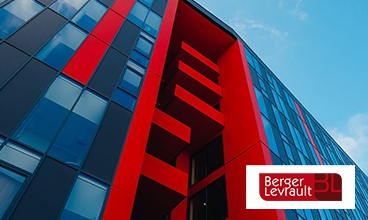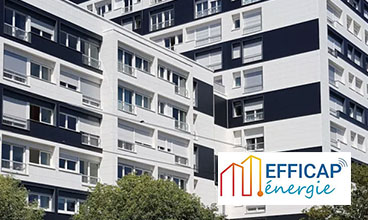
Optimising the energy performance of social housing using the IoT
PROCHALOR, SEMCRA and Adeunis optimise energy and thermal comfort in collective housing.

Guarantee air quality

Improve thermal comfort
Taking into account the comfort of a building’s occupants is essential.
To guarantee the comfort, satisfaction and productivity of building users, it is important to analyse the various environmental factors in a room.
In addition to CO2 concentration levels, data on temperature, humidity and VOCs provide a concrete response to the comfort of building occupants.
Regular monitoring of these environmental factors not only helps to prevent thermal discomfort, but also to limit the health risks associated with mould growth, for example.
In this way, the building itself is protected and preserved.
What’s more, analysing data on temperature, humidity and presence, then adjusting heating and air conditioning requirements accordingly, will also lead to significant energy savings.
All these factors need to be taken into account to ensure a better quality of life.





Connected sensors monitor air quality, temperature and humidity. This data can be used to adjust the use of ventilation systems accordingly.
The benefits include better air quality, increased comfort for occupants, energy savings through more efficient use of ventilation, and a reduction in the health risks associated with poor indoor air quality.

Thanks to the IoT, the use of heating and air conditioning can be optimised. Intelligent sensors monitor temperature, humidity and occupant presence, allowing heating or cooling to be regulated to maintain comfort levels while minimising energy consumption.
The resulting benefits include energy savings, reduced costs and improved comfort for occupants.

COMFORT
LoRaWAN / Sigfox

C. SERENITY
LoRaWAN / Sigfox

BREATH
LoRaWAN / Sigfox

DELTA P
LoRaWAN / Sigfox

C. SERENITY
NB-IoT / LTE-M

COMFORT
NB-IoT / LTE-M
Poor indoor air quality (IAQ) has significant effects on health. When you consider that the average adult spends 80% of his or her time in enclosed spaces, and that indoor air is 5 to 10 times more polluted than outdoor air, it’s easy to understand the importance of this issue.
Today, all buildings are affected by indoor air quality issues. There are a multitude of parameters and pollutants to monitor (temperature, humidity, fine particles, volatile organic compounds, etc.), whether in response to legal obligations, health issues or economic considerations.
In order to assess indoor air quality (IAQ), the first thing to do is to put in place solutions to measure the level of concentration of the various pollutants and components present in the room.
Sensors must therefore be installed to record the data to be studied:
Once this data has been collected, the important thing is to know how to read it. To do this, there are indicators, such as ICONE and TAIL, which combine the data collected by these sensors and give a clear and easily understandable indication of the level of air quality.
To find out more about indoor air quality:
Discover real-life examples of connected buildings, solutions and advice to improve the comfort of your connected buildings.

PROCHALOR, SEMCRA and Adeunis optimise energy and thermal comfort in collective housing.

Find out how Berger-Levrault is using IoT to reduce energy consumption and improve employee comfort.

Find out how EFFICAP is reducing its customers’ heating costs in multi-family housing with Adeunis IoT sensors.

Do you want to digitise your office buildings and make them more economical, comfortable and attractive? Discover our IoT solutions…

Find out how VIPARIS, a convention and exhibition venue manager, is monitoring air quality at a dozen major event venues in Paris.
To meet your Smart Building needs, Adeunis offers a range of connected sensors and services to support you at every stage of your IoT digitalization project.
Our multi-technology solutions can be adapted to suit your needs: LoRaWAN, Sigfox, 5G: LTE-M1 or NB-IoT.


Use IoT sensors to retrieve essential building operating data

Use the data collected to :


Our team is here to help you. If you have any questions or encounter any problems when using our application, please don’t hesitate to contact us. We’re here to solve any problems you may encounter and provide you with the best possible experience.
expertise to support you, from the diagnosis to the implementation of your solution
Subscribe to our newsletter!
Your e-mail address is only used to send you our newsletter and information about our company. You can unsubscribe at any time using the link included in each email.
